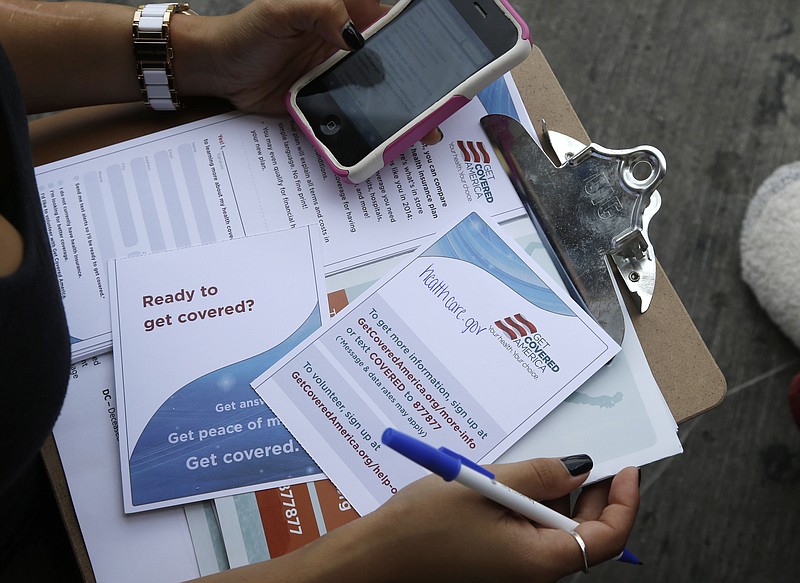The efforts to sabotage the Affordable Care Act known commonly as Obamacare seem simply endless.
Sometimes that's the result of partisanship: Many Republican politicians in state and federal government just can't move past the idea that a health care plan pushed by Democrats and especially President Barack Obama had and has growing American consumer use and respect.
And sometimes the effort to undermine the law that brought affordable insurance to millions of Americans is just a matter of corporate appetite among medical providers and the middlemen of the insurance industry - most of whom show a profit at the end of each year, even if they are nonprofit like Erlanger hospital or BlueCross BlueShield.
This week, headlines trumpeting that ACA exchange rates would "skyrocket" as BlueCross BlueShield announced it will increase premiums by 62 percent (Cigna and Humana are increasing rates by 46 and 44 percent, respectively) made it sound as though the sky is falling for all of us. Especially with this attendant quote by Tennessee Sen. Lamar Alexander:
"Tennesseans cannot afford 44 to 62 percent Obamacare price increases that will force them to make difficult decisions about their daily lives and their family budgets. They should not have to pay the price for a terrible health care law and the refusal by Democrats in Washington to see what is plainly obvious - that Obamacare is failing."
To be kind, Alexander's bluster is the most disingenuous of outrageous hyperbole.
For context, this rate increase affects one half of 1 percent of Tennesseans - a few more than 34,700 of the state's 6.5 million people. All together less than 4 percent - 231,705 Tennesseans - get health insurance through ACA exchanges, and 60 percent of these people who are among the working poor pay less than $100 a month for insurance coverage.
But what about the rate hikes, you ask?
According to the U.S. Department of Health & Human Services, an estimated 81 percent of Tennessee HealthCare.gov consumers could still purchase a plan for less than $75 a month, even if all final rates were to increase by 50 percent.
Meanwhile, since this much-maligned Obamacare became law, health care prices have risen at the lowest rate in 50 years, and premiums for the 150 million Americans with employer-sponsored insurance have grown at some of the slowest rates on record. HHS figures show the average premium for employer-sponsored family coverage rose about 4 percent in 2015, far below the almost 8 percent average rate seen from 2000 through 2010.
It may not feel that way to many of us, however, as we struggle with higher deductibles pushed by private employers shifting the cost of insurance more to employees.
Kaiser.org reports that in 2014 the national average private premium deductible had risen 47 percent just since 2009.
Kaiser also found the average private premium increases following the ACA's adoption were about 9 percent but only 3 percent of that was because of the ACA - primarily because of the law's insistence on more coverage. The remaining 6 percent was - as usual - the ever-increasing cost in health care. Hospitals and insurers are doing well - with or without the ACA. They just raise the rates.
Although BlueCross reported losing $311 million on Obamacare exchange plans during the first two years and projects losing another $100 million this year, the nonprofit insurance giant reported an overall 2015 profit of $6 million thanks to investment income and other insurance lines. Cigna and Humana, both for-profit companies, reported respective overall profits of $510 million and $311 million last year, according to Fox Business and Businessinsurance.com. In May, Erlanger Health Systems projected a $15.2 million profit.
In Tennessee, the real "sky is falling" take-away is the money we've thrown away and continue to throw away by not nagging our state lawmakers to pass Insure Tennessee, Gov. Bill Haslam's federally negotiated waiver version of the Affordable Care Act.
With the ACA came a federal government pledge to pay for the state's cost of adopting the program at 100 percent - $2.8 billion - for a two-year pilot, and 90 percent thereafter. Tennessee hospitals even pledged to pay the state's share of $74 million for the pilot.
Refusing to get with the ACA program over 10 years means Tennessee will have left $22.5 billion in lost federal funding on the table, according to a 2014 report by McClatchy Newspapers and the Urban Institute. The state-by-state study found that in Tennessee, expanding Medicaid to align with the ACA would have cost an estimated $1.7 billion over 10 years.
In other words, we would spend $1.7 billion to gain $22.5 billion in federal tax dollars that Tennesseans have already paid and already are committed to pay.
Instead, the Tennessee General Assembly passed a law requiring the governor to get legislative approval to join the ACA. Then twice a legislative committee killed a bill to give Haslam that approval.
Obamacare is not the failure.
Partisanship and greed are the failures. And they cost all of us - not just one half of 1 percent of Tennesseans.
